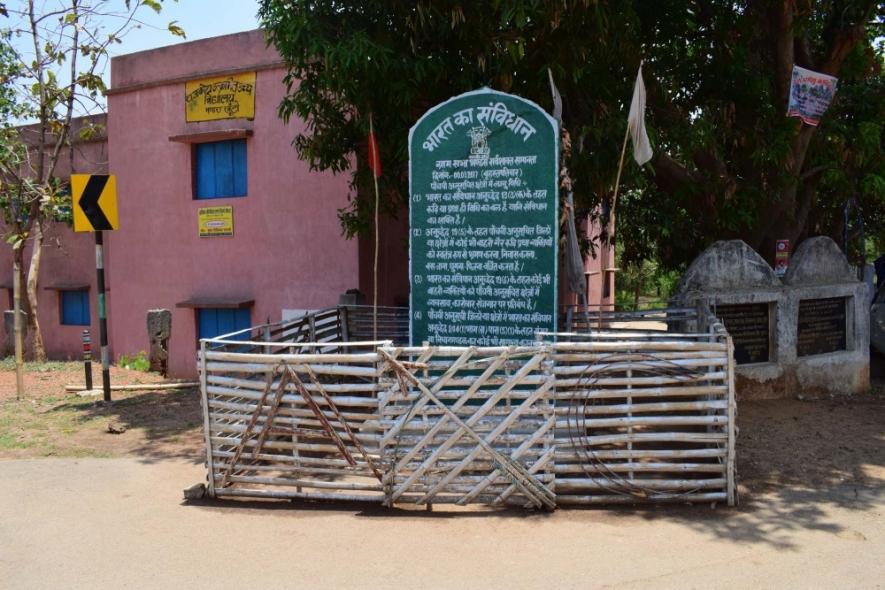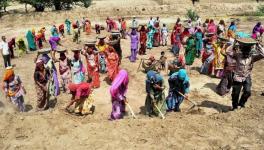Jharkhand Adivasis: We Are Not Against Our Country; We Just Want Rights Over Our Resources

Huge stone slabs carved with the details of the constitutional provisions and laws that protect the rights of the tribals under the Fifth Schedule of the Constitution have been put up in over 300 villages across five districts in Jharkhand.
Villagers belonging to different tribal settlements are using Pathalgadi as a mode of protest against the state government’s alleged anti-tribal policies, reported Scroll.
Pathalgadi is a tradition that is being followed by the Munda community of Jharkhand for hundreds of years. The tradition involves setting up of stones to notify or distinguish boundaries. Similarly, the huge stones are also placed to honour the community ancestors.
However, in recent times, inscribing the excerpts from the Panchayats (Extension to Scheduled Areas) Act (PESA), 1996, which talks about the supremacy of Gram Sabhas and encourages local self-government, has emerged as a fast-growing phenomenon in tribal areas since early last year. The community believes that this will empower the villages as an administrative unit.
Far From Proper Implementation, Laws Remain on Paper Only
On April 24, this year, all political parties celebrated the silver-jubilee of Panchayati Raj on a nationwide scale. From politicians to bureaucrats, all echoed the significance of democratic grassroots governance to secure the grassroots development. Though the celebrations exalted the achievements of Panchayats, it eclipsed the poor implementation of PESA, 1996 in regions comprising scheduled tribes.
Panchayats (Extension to Scheduled Areas) Act (PESA), 1996, under Fifth Schedule of the Constitution, deals with the administration and control of Scheduled Areas as well as of Scheduled Tribes residing in any state other than the states of Assam, Meghalaya, Tripura and Mizoram. Under the PESA Act, a village shall have a Gram Sabha managing its affairs in accordance with traditions and customs. It exclusively empowers Gram Sabha to carry out executive functions to “approve plans, programmes and projects for social and economic development; identify persons as beneficiaries under the poverty alleviation and other programmes; issue a certificate of utilisation of funds by the Panchayat for the plans; programmes and projects.”
Unfortunately, according to The Wire report, the act has been violated time and again, with several cases pending in the court, which involves the proclamation of Gram Panchayats as Nagar Panchayats to bypass the provisions of PESA Act.
The interests of the Adivasis and other forest-dwelling people have been largely ignored by the state, especially in the last three decades of economic globalization.
Moreover, under the banner of Momentum Jharkhand project, the BJP government, led by Chief Minister Raghubar, in 2016, tried to bring amendments to the Chotanagpur Tenancy Act, 1908 and the Santhal Pargana Tenancy Act, 1876. The amendments intended to open up tribal lands to private corporations, so that they can conduct industrial activities such as mining. The Adivasis fear that corporate ownership of resources will inevitably cause huge damage to the land and their livelihood.
Attempts made by the state to allow the corporate appropriation of the natural resources, while ignoring the interests of the tribal people, has brought about an increase in militarization and violence in the region. It has also triggered movements, which remonstrate against the idea of ‘development’ that involves the destruction of the environment.
A for Adivasi, B for Bideshi, C for Chotanagpur
What are the demands of these tribal people who don’t understand the concept of greed and corporate profit? What are the demands of these communities which do not bolster the idea of destroying forests, water and air in exchange for minerals to fulfil urban needs? What are the demands of these citizens who have to fight for their basic fundamental rights while proving their love and respect for the nation?
The state has failed miserably in searching answers to these questions. The state, in the process of maintaining its corporate camaraderie, has ignored the welfare of the most marginalized populations of the country. The state, in the most barbaric manner, has robbed these people of volition and tried to demonstrate absolute command over their destiny.
Fearing the outsiders, not taking part in elections and forming an ‘Adivasi board’, which would teach the tribal history and culture, are all part of the growing resentment of a whole community against the state which has failed to preserve tribal identity.
Get the latest reports & analysis with people's perspective on Protests, movements & deep analytical videos, discussions of the current affairs in your Telegram app. Subscribe to NewsClick's Telegram channel & get Real-Time updates on stories, as they get published on our website.
























